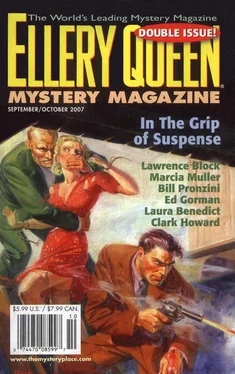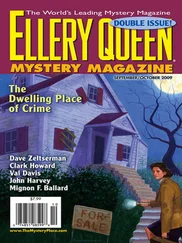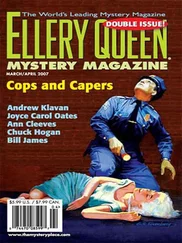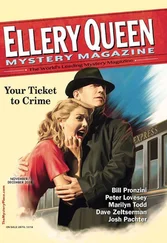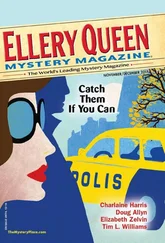Donna Andrews - Ellery Queen’s Mystery Magazine. Vol. 130, No. 3 & 4. Whole No. 793 & 794, September/October 2007
Здесь есть возможность читать онлайн «Donna Andrews - Ellery Queen’s Mystery Magazine. Vol. 130, No. 3 & 4. Whole No. 793 & 794, September/October 2007» весь текст электронной книги совершенно бесплатно (целиком полную версию без сокращений). В некоторых случаях можно слушать аудио, скачать через торрент в формате fb2 и присутствует краткое содержание. Город: New York, Год выпуска: 2007, ISBN: 2007, Издательство: Dell Magazines, Жанр: Детектив, на английском языке. Описание произведения, (предисловие) а так же отзывы посетителей доступны на портале библиотеки ЛибКат.
- Название:Ellery Queen’s Mystery Magazine. Vol. 130, No. 3 & 4. Whole No. 793 & 794, September/October 2007
- Автор:
- Издательство:Dell Magazines
- Жанр:
- Год:2007
- Город:New York
- ISBN:ISSN 0013-6328
- Рейтинг книги:4 / 5. Голосов: 1
-
Избранное:Добавить в избранное
- Отзывы:
-
Ваша оценка:
- 80
- 1
- 2
- 3
- 4
- 5
Ellery Queen’s Mystery Magazine. Vol. 130, No. 3 & 4. Whole No. 793 & 794, September/October 2007: краткое содержание, описание и аннотация
Предлагаем к чтению аннотацию, описание, краткое содержание или предисловие (зависит от того, что написал сам автор книги «Ellery Queen’s Mystery Magazine. Vol. 130, No. 3 & 4. Whole No. 793 & 794, September/October 2007»). Если вы не нашли необходимую информацию о книге — напишите в комментариях, мы постараемся отыскать её.
Ellery Queen’s Mystery Magazine. Vol. 130, No. 3 & 4. Whole No. 793 & 794, September/October 2007 — читать онлайн бесплатно полную книгу (весь текст) целиком
Ниже представлен текст книги, разбитый по страницам. Система сохранения места последней прочитанной страницы, позволяет с удобством читать онлайн бесплатно книгу «Ellery Queen’s Mystery Magazine. Vol. 130, No. 3 & 4. Whole No. 793 & 794, September/October 2007», без необходимости каждый раз заново искать на чём Вы остановились. Поставьте закладку, и сможете в любой момент перейти на страницу, на которой закончили чтение.
Интервал:
Закладка:
Finally unafraid, Kurt inspects the wall nearest the skeleton to see if maybe Danny Kelley had scratched Livia’s name into the wall with his dying strength. But Kurt had emptied Danny Kelley’s pockets before putting him in the room, taking his cigarettes, money, keys, and matches. Danny Kelley had died in the dark, an erstwhile groom forever separated from his bride. But he would no longer be alone.
Kurt’s mother would not leave the house until it was over. For those first few days, the most worrisome days, the days when Kurt would begin to shake and sweat at work thinking about Danny Kelley, she would play the piano for hours on end to keep from hearing the noise coming from the basement. At night she played the radio just loudly enough. She would make Kurt cold suppers so she wouldn’t have to linger too near the basement door. They would eat on the back porch or upstairs in his father’s old bedroom. Then, for a whole day, then two, then three, they heard nothing.
Kurt replaces the shelves and restocks them, filling a single bag to take upstairs. He crumples the empty bag that had held the fertilizer he’d hurriedly sprinkled over Brent’s body at the last moment, hoping that it had enough lime in it to have some effect.
He finds Livia sitting at the dining room table. Livia — who he knows is made of iron inside — sits slumped over the table with her head resting on her arms. His heart aches for her, for Mitzy. At his touch, Livia looks up. Her face is lined with care, but she hasn’t been crying. It is Mitzy who will be their biggest worry.
Kurt sits in the chair beside her rather than at his usual place at the head of the table. Upstairs, Mitzy, with the help of a couple of painkillers from an old prescription, is finally sleeping.
“I was thinking,” Kurt says softly, “of who Brent reminded me of.”
Livia shakes her head. “No, not now,” she says. She reaches out to cover Kurt’s hand briefly with her own, then goes into the kitchen. Kurt hears her get a glass from the cabinet and turn on the faucet. The water runs and runs, and the sweet, domestic sound of it blends with his single thought: She knows about everything.
For the benefit of Eda Hidebaugh, when it is full dark, Livia combs back her hair and Kurt helps her don Brent’s letter jacket. He watches as she backs Brent’s car out into the alley and drives away to leave it in the lot of a bar to which he often took Mitzy. A half-hour later, praying that Mitzy will stay in her stuporous sleep, Kurt picks up Livia and drops her off a few blocks from home.
He is waiting when Livia comes in by the front door, which is hidden from Eda Hidebaugh’s gaze. When she holds out the handkerchief that he had given her to wipe her fingerprints from the car, Kurt takes her into his arms to pull her firmly to him. Her body feels soft and malleable to him, as though he could pull her close enough that they could become one person. She belongs to him now, and no one else.
Remote Control
by Mick Herron
© 2007 by Mick Herron
Mick Herron’s last book to see print in the U.S., Why We Die, received a starred review from PW , which praised his series P.I., Zoë Boehm, as “smart, dogged, and never down for the count.” Mr. Herron is a master plotter, and manages here to create both a clever twist and an interesting snap-shot of modern London.
It starts on a train. Maurice’s fault. Maurice is about my age, but since his divorce, he’s let himself go: his suits overdue a dry-cleaning; his shirts frayed at the cuff. Some days, he could stand a little closer to the shower. To hear him tell it, though, he’s better off.
“Finally I get a little peace,” he says. “That woman could talk for England. They should record her phone calls for training purposes.”
But for all the spin, it’s not just his cuffs that are frayed lately. Small things rattle Maurice’s cage. Some days we don’t get a seat — it’s a busy line — and once he’d have grinned and deployed those origami skills commuters develop for reading newspapers upright in a crowd. Now he seethes instead, staring grimly out of the window as if, instead of fields and dormitory towns, we’re flashing through a post-nuclear landscape. His hair needs attention. He still has good teeth, though.
“Jesus,” he tells me. “They should make it a crime.”
“Make what a crime, Maurice?”
“Coming into the capital without due purpose,” he says. “Some of these dumbbells, they’re going shopping, can you believe it? They get on a train, eight-ten in the morning, they’re going shopping on Regent Street. So us poor working stiffs have to stand. Hell of a way to prepare for the day ahead.”
“Most of them have jobs, Maurice.”
“The ones that don’t should be stuffed in the luggage racks.”
I have a job. I work in corporate finance, and earn nicely without causing outrage. And Maurice has a job. His company operates CCTV systems. I sometimes wonder if it’s the vaguely Hollywood flavour of this that has tinted his speech with Americanisms. And, too, he sees a lot of bad behaviour. Maurice doesn’t monitor screens himself, but what he calls the show-stopper stuff gets spliced onto tapes and shown at parties. His outfit has a security contract which puts cameras along the South Bank, all the way to the Isle of Dogs. He’s seen people screwing against the wall in broad daylight, and not just professionally, either. Muggings, of course; rapes, fistfights, stabbings. Politicians arm in arm with local gangsters. Last year he seemed happy in his work, but as the days grind by, the wells we draw from sink deeper. Maurice has a new boss, and this is a travesty of justice. Maurice should have been the new boss — not this punk, which is how Maurice refers to him. “This punk,” he says. “This goddamn kid.” This goddamn kid is ten years younger, two stone lighter, and fifteen grand a year richer than Maurice is right now. Maurice feels he’s been gazumped. “That was my job,” he says. “Goddamn punk came out of nowhere.”
Remain detached , I want to tell him. Stay in control. Or you will rupture one day; burst one of those complicated valves that keep the heart pumping. Once you let the rage inside, it’s hard to get it out. Trust me. I know about this.
Maurice hasn’t mentioned the boss in a while. New angers blossom daily.
“Freakin’ personalised numberplates,” he says this morning. “Don’t you hate them?”
“They have their uses,” I say. “Easy to remember.”
“Yeah, well, I’m not forgetting this one in a hurry.”
And he goes into a spiel about being cut off by a red sports car at the weekend. Maurice was entirely in the right. These twits in their flash motors: Decapitation would be too quick.
“She was driving,” he says. “But it’s him I remember. Shaved bald, and when did that get to be cool? I remember in the good old days, your chrome-domes had the grace to be ashamed.”
He wore an earring, too, and Maurice has much to say on this subject.
“I figure he had his hand up her skirt, and that’s how come she was in a rush. Looked old enough to be his big sister.”
The train pulls into platform 8, and the long forever of its gradual halt begins; the release of its doors.
“Whoosh,” he says, and I think he’s imitating the doors, but he isn’t. “W-H-O-O-5-H. The S was a 5.”
On the concourse, we make our usual farewells.
“Don’t let the bastards grind you down,” he warns me.
“Remember,” I tell him. “They can kill you. But they’re not allowed to eat you.”
But I say it distractedly, because my mind is elsewhere.
If you want to know where it gets you — letting the rage inside — keep your eyes open as you slog around the city. You’ll see people behaving like all kinds of weather at once: fizzing and spitting; boiling and baked; grey and grim. Just by walking where somebody else wants to be, you’re making mortal enemies for life. Somebody asked me “What the hell?” last week because I slowed to check a shop window, and I’ve no doubt he thought it a reasonable question. Trench warfare has its critics, but city life is no picnic either. A Daily Mail columnist once spent a morning on the pavement outside Bond Street station, and not a soul stopped to check he wasn’t dead. Though to be fair, they might have recognised him. One less Mail columnist would brighten anyone’s day.
Читать дальшеИнтервал:
Закладка:
Похожие книги на «Ellery Queen’s Mystery Magazine. Vol. 130, No. 3 & 4. Whole No. 793 & 794, September/October 2007»
Представляем Вашему вниманию похожие книги на «Ellery Queen’s Mystery Magazine. Vol. 130, No. 3 & 4. Whole No. 793 & 794, September/October 2007» списком для выбора. Мы отобрали схожую по названию и смыслу литературу в надежде предоставить читателям больше вариантов отыскать новые, интересные, ещё непрочитанные произведения.
Обсуждение, отзывы о книге «Ellery Queen’s Mystery Magazine. Vol. 130, No. 3 & 4. Whole No. 793 & 794, September/October 2007» и просто собственные мнения читателей. Оставьте ваши комментарии, напишите, что Вы думаете о произведении, его смысле или главных героях. Укажите что конкретно понравилось, а что нет, и почему Вы так считаете.
